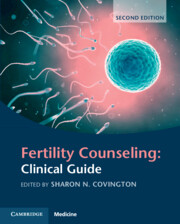Book contents
- Fertility Counseling: Clinical Guide
- Fertility Counseling: Clinical Guide
- Copyright page
- Dedication
- Contents
- Preface
- Contributors
- I Introduction
- II Therapeutic Approaches
- III Third Party Reproduction: Assessment and Preparation
- IV Addressing the Needs of Diverse Populations
- V Special Topics in Fertility Counseling
- Chapter 19 Resilience in Reproductive Loss
- Chapter 20 Reproductive Trauma and PTSD: On the Battlefield of Fertility Counseling
- Chapter 21 Pregnancy Loss Counseling
- Chapter 22 “A Little Bit Pregnant”: Counseling for Recurrent Pregnancy Loss
- Chapter 23 Pregnancy and Postpartum Adjustment in Fertility Counseling
- Chapter 24 Walking the Tightrope: The Pregnant Fertility Counselor
- VI Practice Issues
- The International Glossary on Infertility and Fertility Care, 2017
- Index
- References
Chapter 20 - Reproductive Trauma and PTSD: On the Battlefield of Fertility Counseling
from V - Special Topics in Fertility Counseling
Published online by Cambridge University Press: 24 November 2022
- Fertility Counseling: Clinical Guide
- Fertility Counseling: Clinical Guide
- Copyright page
- Dedication
- Contents
- Preface
- Contributors
- I Introduction
- II Therapeutic Approaches
- III Third Party Reproduction: Assessment and Preparation
- IV Addressing the Needs of Diverse Populations
- V Special Topics in Fertility Counseling
- Chapter 19 Resilience in Reproductive Loss
- Chapter 20 Reproductive Trauma and PTSD: On the Battlefield of Fertility Counseling
- Chapter 21 Pregnancy Loss Counseling
- Chapter 22 “A Little Bit Pregnant”: Counseling for Recurrent Pregnancy Loss
- Chapter 23 Pregnancy and Postpartum Adjustment in Fertility Counseling
- Chapter 24 Walking the Tightrope: The Pregnant Fertility Counselor
- VI Practice Issues
- The International Glossary on Infertility and Fertility Care, 2017
- Index
- References
Summary
Trauma occurs when the ability to envisage our future and feel safe in the world is no longer possible. While trauma is often a one-time horrific occurrence, it can also be chronic in nature.Indeed, reproductive trauma can encompass both types of anguish: the frightening and painful loss of a miscarriage, with massive bleeding and the potential need for surgery, or the seemingly endless cycle of hope and despair during fertility treatments. Sadly, for our patients, it is not uncommon to experience both infertility and pregnancy loss, and like a soldier on the battlefield, it can be protracted, leaving deep psychological wounds. This chapter not only explores the trauma that occurs in reproductive patients, but also how we, as fertility counselors, cope with being on the battlefield with them.
- Type
- Chapter
- Information
- Fertility Counseling: Clinical Guide , pp. 204 - 211Publisher: Cambridge University PressPrint publication year: 2022

